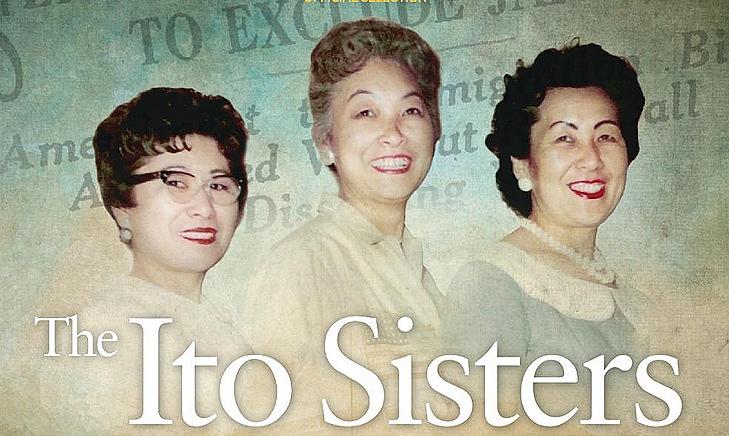A documentary centered around the interviews of three sisters, “The Ito Sisters: An American Story” is a pertinent reminder of Japanese-Americans’ experiences during California’s anti-Japanese movement.
Feb. 19, the Japanese American Day of Remembrance, marks President Franklin D. Roosevelt’s signing of Executive Order 9066. That order led to the internment of over 120,000 Japanese Americans during World War II. To commemorate this turning point in history, the UC San Diego Nikkei Student Union hosted a free showing of “The Ito Sisters: An American Story,” followed by a Q&A with director and producer Antonia Grace Glenn and scholar Evelyn Nakano Glenn. The event was held in Price Center Theater on Friday, Feb. 8. Kevin Amemiya, the Cultural Chair of the Nikkei Student Union, said in reference to the widespread mistreatment of Japanese Americans, “These documentaries are a great way to inform audiences of how real this was, and not just that it can happen once, but that it can happen again.”
“The Ito Sisters: An American Story” combines the historical backdrop of the 20th century, particularly around the time of World War II, with the lived experiences of three Japanese American sisters: Natsuye (Nancy), Hideko (Hedy), and Haruye (Lillian). As survivors of the Japanese internment camps, the sisters recount personal stories of their parents, who immigrated from Japan to America, and of each other — all in the form of candid home videos. The videos were taken by other family members, such as director Antonia Grace Glenn, the granddaughter of Lillian, during the early 2000s. They had never heard of some of the sisters’ stories, who were well into their 80s and 90s, and took the opportunity to interview and record them. The project started as a way to archive some family memories, but it ultimately evolved into an effort to preserve an often-overlooked part of American history.
The documentary addresses the long history of anti-Japanese sentiment in America, particularly in California, through the use of various primary sources such as racially-charged newspaper clippings, quotes from presidents and governors, and propaganda. From the outright banning of all Asian immigration to suffering attacks from white agricultural laborers, the precarious political climate of the early 20th century created a volatile stage for the lives of the Ito sisters and their parents.
The home videos, as the director explained in the Q&A, are not professionally filmed; sometimes plane engines drown out the sisters’ words or the camera zooms too closely into their faces. This amateur style, however, offers a layer of honest vulnerability and a sense of familial intimacy to the interviews. In the interviews, the three sisters reflected upon their memories with a surprising amount of humor, cracking jokes about each other’s younger selves. They also spoke bluntly about their arranged marriages (“I don’t remember [my first husband],” shrugged one sister) and attending segregated schools (they apparently couldn’t grasp the larger implications of segregation as children). They recalled, with clear admiration for their parents’ hard work, their family’s endurance through challenges like the Great Depression, the internment camps, and their mother’s subsequent cancer. To supplement these stories, the documentary incorporates animations resembling colorful paper cutouts and an emotional original score “evocative of a time gone by,” as one audience member put it.
Despite technical difficulties during the screening, the audience, some of whom were related to the sisters, and the panel engaged in a thoughtful, casual Q&A session. For example, the uniqueness of the sisters’ storytelling was discussed. The sisters shared about the injustices they had experienced first-hand with stoicism, composure, and even positivity (“the food was pretty good at the camps,” one sister chuckled). The fact that they were even willing to share their experiences was remarkable, because it is common for other survivors, many of whom have passed away, to not even tell their children about it. Lately, however, as mentions of other similar films were brought up during the Q&A, the growing number of stories surfacing is promising in keeping such stories alive.
When asked about their concluding thoughts, Antonia Grace Glenn and Evelyn Nakano Glenn brought up two topics. Evelyn, also a granddaughter of one sister, drew parallels between the sisters’ stories and today’s issues of family separation at the border and the incarceration of children. By telling the stories of these three women, she hoped to raise awareness for current immigration issues and reduce “the long-term emotional impact” on generations of families. Antonia expressed her desire to show the work and domestic lives of women, which, she believes, is a core part of history that is not regarded nor respected enough. She finished by encouraging the audience to find out about their elders’ histories. Like “The Ito Sisters,” there are stories out there worth sharing and learning from.
Grade: B+
Director: Antonia Grace Glenn
Starring: Hedy Kadoi, Lillian Nakano, Nancy Takahashi
Initial Release Date: Dec 5, 2017
Event Date: Feb 8, 2019
Image courtesy of Rafu.














